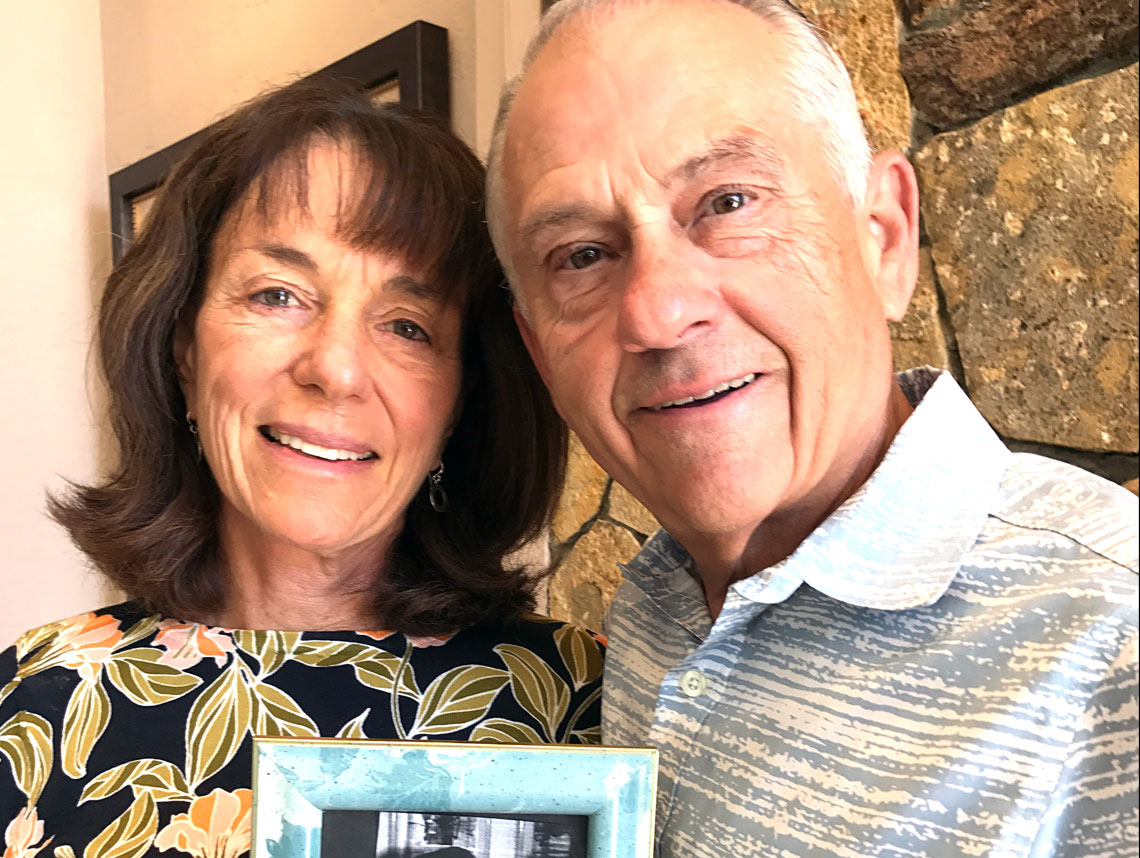 Photo of Sherry Mendelson Davidowitz and her husband Fred.
Photo courtesy of Sherry Mendelson Davidowitz.
Photo of Sherry Mendelson Davidowitz and her husband Fred.
Photo courtesy of Sherry Mendelson Davidowitz. My mother-in-law, Sarah, survived Auschwitz, but at age 76, cancer of the pancreas did her in. Being a physician, I was involved, along with my husband, Fred, in her medical care during the final months. One afternoon, Fred and I attended an oncology appointment with Sarah.
“Mrs. Davidowitz, tell me, when you were in the camps, were there any toxins in the air where you worked?” Dr. Levin asked.
He threw out the question, seemingly comfortable discussing the concentration camps. The office, cluttered with books, charts and diplomas, smelled of cleaning solution. My mother-in-law, barely 5 feet tall, sat in an oversized chair across the desk from Dr. Levin.
“Oh no, the munitions factory where I worked was clean, very clean,” Sarah said. She peered at the doctor, hoping he would like her response.
“Did you smell chemicals in the air?” asked the doctor.
“No chemicals,” she said.
“Do you remember names of any materials they used in the factory?” he gently prodded.
“Names, I don’t know. But there was a guard there, one of the bosses. He let me sleep when I was sick and no one was watching. He was good to me,” she said.
“Uh-huh,” Dr. Levin said.
I was surprised that Sarah spoke kindly toward her captors at that moment. She never said much about the camps, but once in awhile something seeped out. When my husband was 11, he was profoundly disappointed when she refused to allow him to join the Boy Scouts. It was only in later years that Sarah told him the uniforms reminded her of the Hitler Youth organization.
This discussion then, was a surprise. I thought that bitterness would emerge, but Sarah chose to emphasize an act of kindness. Dr. Levin surely saw many reactions to impending death. Maybe this was one of them.
Sarah and I didn’t always see eye-to-eye. When I first met her, I was 33 years old, a professional woman, a physician. Her son Fred, born in a displaced persons camp in Bamberg, Germany, was the first child of an extended family dismantled by the Holocaust. He was the phoenix that rose from the ashes.
One Friday night back then after Shabbat dinner, we sat around Sarah and Irving’s table with Fred’s three children from his first marriage. Fred was divorced. He and I were seriously dating. I thought, as a successful Jewish doctor, I was a good catch for their son. Sarah and I cleared plates and set out teacups and pastries for coffee and dessert. Sweet smelling cookies enticed the children to sit a bit longer.
“So Sherry, how much do you work?” asked Sarah, eyeing me as she spoke.
“About 40 hours a week. It’s taken time to build up a psychiatric practice. Now it’s going well,” I said.
“Uh-huh. Do you cook?” she asked.
“Yeah, some,” I said.
“How’s your brisket recipe?” she asked.
“I don’t have one. I don’t like brisket. Too fatty,” I said.
“Oh, I see. Freddie, he loves brisket,” Sarah said.
I hadn’t planned on defending my cooking. Maybe I didn’t make a brisket but if anyone needed help with medical problems, then I was your girl. Sarah shifted her gaze to her grandchildren, who squirmed in their seats waiting for dessert.
“Here you go, bubbelehs. Rainbow cookies,” said Sarah to the children. She handed them a box of multicolored cookies, a traditional favorite among the grandchildren.
Now, nine years later, Sarah sat helplessly in her chair facing Dr. Levin and a terminal cancer diagnosis. I still believed she thought of me as a driven professional woman, capable of husband neglect. Fred and I had married and were raising our three young daughters. We shared the raising of Fred’s older children with his ex-wife.
The next time I saw her, Sarah was home under the care of hospice. It was December, the month of her death. She appeared weak, motionless under the covers. Irving slept in another room away from the IVs and the caretaker. Our oldest daughter, Andrea, having just turned 7, joined me for an overnight with Sarah, along with birds of paradise we picked from our garden.
“Bubbe, we brought flowers,” Andrea said. She placed them in Sarah’s shrunken hands.
“Beautiful,” Sarah said. “Thank you, a paradise for me. Andrea, bubbeleh, go to the kitchen. Zayde has rainbow cookies.”
Andrea hurried off, looking for Irving and the cookies. Then Sarah turned to me. She took my hand.
“Thank you for coming with Andrea,” she said.
“I’m happy to be here,” I said.
I didn’t know what else to say. We both knew that her end loomed ahead.
“Ah, me too. So Sherry, do me a favor,” she said. “See that Irving takes care of his health.”
“I will,” I said.
Then she looked me straight in the eye.
“And, I want you should have my brisket recipe. Freddie loves brisket,” Sarah said.
“Thank you, Sarah,” I said, wiping away tears.
Sherry Mendelson Davidowitz is a psychiatrist and writer who has written
for Jewish Women’s Theatre and currently is writing a memoir.






















 More news and opinions than at a Shabbat dinner, right in your inbox.
More news and opinions than at a Shabbat dinner, right in your inbox.